By Sarah Elaine Zimmerman, LCSW
● Anxiety/Stress ● Trauma ●
Tips for Managing PTSD, Anxiety & Social Anxiety This Holiday Season
During the holiday season there are often many expectations for socializing, shopping, eating and spending time with family. While some of these activities can feel joyful, others might be emotionally or logistically difficult and unrealistic. Time management becomes more complicated, stress increases and self-care may be forgotten. Pay attention to feeling physically unwell, emotionally overwhelmed or to an increase in negative thoughts. Feeling overscheduled and exhausted leads to resentment and irritability toward others.
Shopping/spending and holiday binge-eating can feel out of control and have negative consequences. Pressure to celebrate in a traditional way can cause feelings of fear, dread or being judged for people struggling with Social Anxiety, Generalized Anxiety or Post Traumatic Stress. It’s understandable to want to avoid celebrations with co-workers or traveling to family when there’s been a history of trauma. Divorce can also create divisiveness and guilt with where to spend holidays. This can trigger intense memories, emotional reactions and feeling unsafe.
You deserve a holiday that is meaningful and healthy for you, as you define it.
- Please use your gifts of self-compassion, mindfulness and boundary setting.
- Have a daily check-in with yourself to increase awareness of your thoughts, body sensations and emotions.
- Identify unmet needs and make decisions that prioritize you.
- Allow yourself to have choices and control over who, what and how you spend your time and money.
- It’s okay to say no.
- Schedule time to relax and manage stress just as you do for daily responsibilities and holiday plans.
Need Support? I provide online therapy in Florida, New York, Maryland and Virginia.
Disclaimer: This post is for informational and educational purposes only and does not constitute a therapist-patient relationship. This comment reflects my professional view and opinion. It is one of many possible perspectives and is not a substitute for seeking mental health services.




